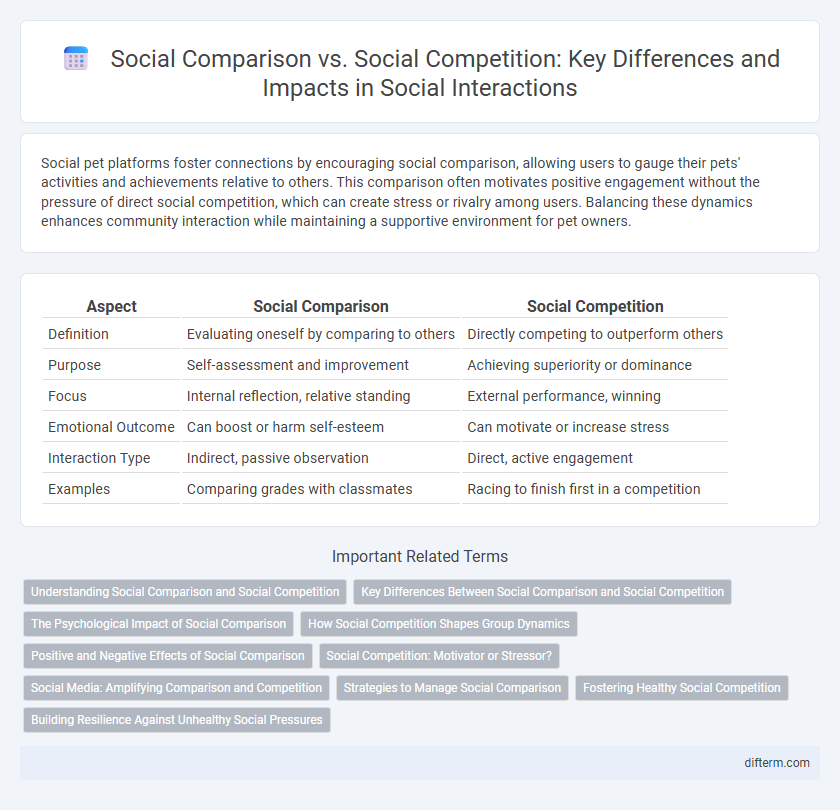Social pet platforms foster connections by encouraging social comparison, allowing users to gauge their pets' activities and achievements relative to others. This comparison often motivates positive engagement without the pressure of direct social competition, which can create stress or rivalry among users. Balancing these dynamics enhances community interaction while maintaining a supportive environment for pet owners.
Table of Comparison
| Aspect | Social Comparison | Social Competition |
|---|---|---|
| Definition | Evaluating oneself by comparing to others | Directly competing to outperform others |
| Purpose | Self-assessment and improvement | Achieving superiority or dominance |
| Focus | Internal reflection, relative standing | External performance, winning |
| Emotional Outcome | Can boost or harm self-esteem | Can motivate or increase stress |
| Interaction Type | Indirect, passive observation | Direct, active engagement |
| Examples | Comparing grades with classmates | Racing to finish first in a competition |
Understanding Social Comparison and Social Competition
Social comparison involves evaluating oneself based on others' abilities or opinions to gain self-awareness, while social competition centers on outperforming others to achieve status or rewards. Understanding these dynamics reveals their impact on motivation, self-esteem, and behavior within social environments. Recognizing the distinct psychological mechanisms behind comparison and competition aids in fostering healthier interpersonal relationships and personal development.
Key Differences Between Social Comparison and Social Competition
Social comparison involves individuals evaluating their abilities or status relative to others to gain self-awareness and motivation, often leading to personal growth or dissatisfaction based on perceived standing. Social competition emphasizes outperforming others to achieve external rewards, recognition, or dominance, driving behavior through rivalry and the desire for superiority. The key differences lie in the internal versus external motivations and the focus on self-evaluation versus winning against peers.
The Psychological Impact of Social Comparison
Social comparison, the act of evaluating oneself against others, often triggers feelings of inadequacy, lowered self-esteem, and anxiety, significantly impacting mental health. Unlike social competition, which centers on outperforming peers, social comparison subtly influences personal identity and emotional well-being through perceived social hierarchies. Research indicates that frequent social comparison correlates with increased depressive symptoms and reduced life satisfaction, highlighting the psychological risks of constant social evaluation.
How Social Competition Shapes Group Dynamics
Social competition drives individuals within groups to enhance performance and assert dominance, intensifying group cohesion and rivalry simultaneously. This dynamic influences leadership emergence, decision-making processes, and resource allocation, often fostering innovation but also potential conflict. Understanding social competition's role is crucial for managing team effectiveness and promoting constructive collaboration.
Positive and Negative Effects of Social Comparison
Social comparison often drives self-improvement and motivation by providing benchmarks for personal growth but can also lead to feelings of inadequacy and decreased self-esteem when individuals perceive themselves as less successful. Positive effects include enhanced goal-setting and increased empathy through understanding others' experiences, while negative effects involve envy, anxiety, and diminished mental well-being. Balancing upward and downward comparisons is crucial to maintaining psychological health and fostering constructive social interactions.
Social Competition: Motivator or Stressor?
Social competition can act as a powerful motivator by driving individuals to improve performance, achieve goals, and enhance social status through comparison with peers. However, excessive social competition often triggers stress responses, leading to anxiety, reduced self-esteem, and unhealthy behaviors as individuals struggle to meet rising expectations. The balance between motivation and stress depends on factors such as individual resilience, social context, and perceived fairness within competitive environments.
Social Media: Amplifying Comparison and Competition
Social media platforms amplify social comparison by showcasing curated highlights of users' lives, intensifying feelings of inadequacy and envy. This environment fosters social competition through metrics like likes, followers, and comments, which quantify social status and influence. The constant exposure to idealized content drives users to compete for online validation, often impacting mental health and self-esteem.
Strategies to Manage Social Comparison
Effective strategies to manage social comparison include practicing self-awareness by recognizing triggers that lead to negative comparisons and setting personal goals that emphasize individual growth rather than competition. Cultivating gratitude and mindfulness helps shift focus from others' achievements to one's own progress, reducing feelings of inadequacy. Limiting exposure to social media and surrounding oneself with supportive, non-judgmental social networks also minimizes detrimental social comparison and fosters healthier social interactions.
Fostering Healthy Social Competition
Fostering healthy social competition involves promoting personal growth and motivation while minimizing negative emotions such as envy and anxiety. Emphasizing individual progress and cooperative goals helps create a supportive environment where participants view competition as an opportunity for self-improvement rather than rivalry. Research shows that balanced social competition enhances social bonds and increases overall well-being by encouraging positive social comparison.
Building Resilience Against Unhealthy Social Pressures
Building resilience against unhealthy social pressures involves recognizing the distinction between social comparison and social competition, where social comparison often fuels insecurity by highlighting personal shortcomings, while social competition can encourage growth through goal-setting and achievement. Developing self-awareness and fostering intrinsic motivation help individuals maintain emotional well-being when exposed to societal expectations or peer benchmarks. Strategies such as mindfulness practices, setting personal goals aligned with values, and limiting exposure to triggering social media content contribute to strengthening psychological resilience.
social comparison vs social competition Infographic

 difterm.com
difterm.com